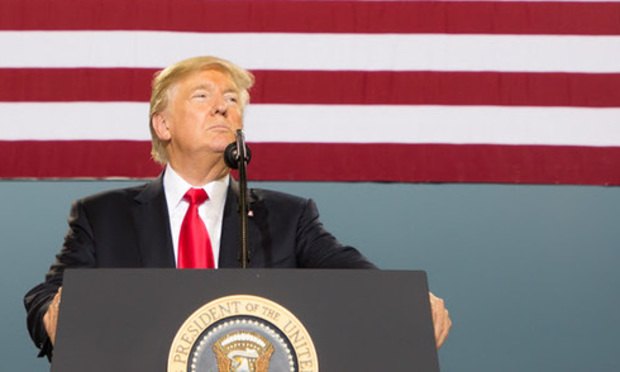Trump Can Face Litigation in State Courts as President, Appellate Panel Majority Rules
"...[T]hough he is tasked with significant responsibilities, the President is still a person, and he is not above the law," the appellate panel majority found.
March 14, 2019 at 12:07 PM
6 minute read
 President Donald Trump. Photo: Shealah Craighead
President Donald Trump. Photo: Shealah Craighead
A split Manhattan state appellate court has rejected President Donald Trump's argument that he is protected by the supremacy clause of the U.S. Constitution from facing litigation in state court.
The Appellate Division, First Department panel majority of Justices Dianne Renwick, Troy Webber, and Cynthia Kern found that Summer Zervos, who alleged Trump sexual harassed her on the set of his reality television show, could proceed with her defamation suit.
“…[T]e current sitting President attempts to shield himself from consequences for his alleged unofficial misconduct by relying upon the constitutional protection of the Presidency,” the panel majority found. “…[W]e find that the Supremacy Clause was never intended to deprive a state court of its authority to decide cases and controversies under the state's constitution.”
The panel's majority, authored by Renwick, reached back to legal arguments formulated during the Clinton administration. The panel pointed to the U.S. Supreme Court's 1997 decision in Clinton v. Jones, which held that the then-president was was not shielded with temporary immunity from federal civil controversies over matters that occurred before he took office.
The majority found the current president was no more shielded by constitutional protections for state litigation than his predecessor was from federal ones.
The Constitution's supremacy clause may allow federal law to supersede state law when in conflict, but isn't a shield from laws that don't, the panel reasoned.
“Since there is no federal law conflicting with or displacing this defamation action, the Supremacy Clause does not provide a basis for immunizing the President from state court civil damages actions,” Renwick wrote.
The panel majority noted that, as there's no federal law limiting state court's jurisdiction, the two tiers run concurrently, and the state court judge then properly exercised jurisdiction in the matter when the lower court denied Trump's earlier motion to dismiss.
The suit was brought by Zervos in January 2017. She claimed that in two separate incidents Trump made unwanted sexual advances toward her while she was a contestant on “The Apprentice.” During the 2016 presidential campaign, Trump allegedly defamed Zervos when he claimed her allegations were lies.
Trump sought to dismiss the suit for lack of jurisdiction, or, in the alternative, stay the proceedings until he was out of office. State Supreme Court Justice Jennifer Schecter of Manhattan dismissed the president's motions, finding that the Clinton case, which Trump had said implied supremacy over state court actions because they lacked direct control over a president, pointed to an opposite conclusion.
In siding with Schecter's reasoning, the appellate panel majority said Trump's supremacy clause argument that the federal executive branch was essentially beyond the reach of state courts “finds no support in constitutional text or case law.”
“…[T]hough he is tasked with significant responsibilities, the President is still a person, and he is not above the law,” Renwick wrote.
For the supremacy clause to kick in, an affirmative action is required to take jurisdiction away from the state courts, not simply being president of the United States. That the alleged acts at issue occurred before he was in office, and have no bearing on his official duties only further eviscerates the argument Trump should be immune from state actions, the panel majority reasoned.
The majority also dismissed the issue of state's having undue control over the president as a basis for immunity. Trump raised the issue, based on a footnote in Clinton, that not being part of the federal system, a state court can't hold the president to account. The panel majority rejected this argument, too, as immaterial considering the overall Clinton decision and the lack of immunity provided through a law passed by Congress.
“Contrary to defendant's contention, Clinton v. Jones did not suggest that its reasoning would not apply to state court actions. It merely identified a potential constitutional concern,” Renwick wrote, adding that state courts were likely sensitive enough to the issue to never raise legitimate concerns about overreaching in their demands on a sitting president.
In their dissent, Appellate Justices Peter Tom and Angela Mazzarelli agreed with Trump's argument that subjecting him to state trial court's jurisdiction “imposes upon him a degree of control by the State of New York that interferes with his ability to carry out his constitutional duty of executing the laws of the United States.”
“Since the Supremacy Clause guarantees that any effort by the individual states to annul, minimize, or otherwise interfere with those laws will be struck down, it follows that any effort by a state court to control the President must likewise fail,” Mazzarelli argued in the dissent.
Zervos is represented on appeal by Cuti Hecker Wang name attorney Mariann Wang. In a statement, Wang said she and her client were heartened the First Department “once again” affirmed the president is not above the law.
“The case has proceeded in the trial court and discovery continues. We look forward to proving to a jury that Ms. Zervos told the truth about Defendant's unwanted sexual groping and holding him accountable for his malicious lies,” Wang said.
Trump is represented in the matter by Kasowitz Benson Torres name attorney Marc Kasowitz. In a statement, Kasowitz said he and his client disagree with the panel's findings.
“We believe that the well-reasoned dissenting opinion by 2 of the 5 justices, citing the U.S. Supreme Court decision in the Clinton v. Jones case, is correct in concluding that the Supremacy Clause of the U.S. Constitution bars state courts from hearing cases against the President while he or she is in office,” Kasowitz said. ” We will seek to appeal the majority decision to New York's highest court, the Court of Appeals, which we expect will agree with the dissent.”
Related:
Protesters Suing Trump Over Scuffle With Security Detail Want to Put Him on Stand
Judge Questions Legality of Trump Campaign's Involvement in Charitable Foundation
This content has been archived. It is available through our partners, LexisNexis® and Bloomberg Law.
To view this content, please continue to their sites.
Not a Lexis Subscriber?
Subscribe Now
Not a Bloomberg Law Subscriber?
Subscribe Now
NOT FOR REPRINT
© 2025 ALM Global, LLC, All Rights Reserved. Request academic re-use from www.copyright.com. All other uses, submit a request to [email protected]. For more information visit Asset & Logo Licensing.
You Might Like
View All

Courts Beginning to Set Standards for Evidence Relying Upon Artificial Intelligence
4 minute read
NY Judge Admonished Over Contributions to Progressive Political Causes

Attorneys ‘On the ‘Move: Morrison Cohen Expands White Collar Practice; O’Melveny Brings Back Corporate Finance Partner
6 minute readTrending Stories
- 1'It's Not Going to Be Pretty': PayPal, Capital One Face Novel Class Actions Over 'Poaching' Commissions Owed Influencers
- 211th Circuit Rejects Trump's Emergency Request as DOJ Prepares to Release Special Counsel's Final Report
- 3Supreme Court Takes Up Challenge to ACA Task Force
- 4'Tragedy of Unspeakable Proportions:' Could Edison, DWP, Face Lawsuits Over LA Wildfires?
- 5Meta Pulls Plug on DEI Programs
Who Got The Work
Michael G. Bongiorno, Andrew Scott Dulberg and Elizabeth E. Driscoll from Wilmer Cutler Pickering Hale and Dorr have stepped in to represent Symbotic Inc., an A.I.-enabled technology platform that focuses on increasing supply chain efficiency, and other defendants in a pending shareholder derivative lawsuit. The case, filed Oct. 2 in Massachusetts District Court by the Brown Law Firm on behalf of Stephen Austen, accuses certain officers and directors of misleading investors in regard to Symbotic's potential for margin growth by failing to disclose that the company was not equipped to timely deploy its systems or manage expenses through project delays. The case, assigned to U.S. District Judge Nathaniel M. Gorton, is 1:24-cv-12522, Austen v. Cohen et al.
Who Got The Work
Edmund Polubinski and Marie Killmond of Davis Polk & Wardwell have entered appearances for data platform software development company MongoDB and other defendants in a pending shareholder derivative lawsuit. The action, filed Oct. 7 in New York Southern District Court by the Brown Law Firm, accuses the company's directors and/or officers of falsely expressing confidence in the company’s restructuring of its sales incentive plan and downplaying the severity of decreases in its upfront commitments. The case is 1:24-cv-07594, Roy v. Ittycheria et al.
Who Got The Work
Amy O. Bruchs and Kurt F. Ellison of Michael Best & Friedrich have entered appearances for Epic Systems Corp. in a pending employment discrimination lawsuit. The suit was filed Sept. 7 in Wisconsin Western District Court by Levine Eisberner LLC and Siri & Glimstad on behalf of a project manager who claims that he was wrongfully terminated after applying for a religious exemption to the defendant's COVID-19 vaccine mandate. The case, assigned to U.S. Magistrate Judge Anita Marie Boor, is 3:24-cv-00630, Secker, Nathan v. Epic Systems Corporation.
Who Got The Work
David X. Sullivan, Thomas J. Finn and Gregory A. Hall from McCarter & English have entered appearances for Sunrun Installation Services in a pending civil rights lawsuit. The complaint was filed Sept. 4 in Connecticut District Court by attorney Robert M. Berke on behalf of former employee George Edward Steins, who was arrested and charged with employing an unregistered home improvement salesperson. The complaint alleges that had Sunrun informed the Connecticut Department of Consumer Protection that the plaintiff's employment had ended in 2017 and that he no longer held Sunrun's home improvement contractor license, he would not have been hit with charges, which were dismissed in May 2024. The case, assigned to U.S. District Judge Jeffrey A. Meyer, is 3:24-cv-01423, Steins v. Sunrun, Inc. et al.
Who Got The Work
Greenberg Traurig shareholder Joshua L. Raskin has entered an appearance for boohoo.com UK Ltd. in a pending patent infringement lawsuit. The suit, filed Sept. 3 in Texas Eastern District Court by Rozier Hardt McDonough on behalf of Alto Dynamics, asserts five patents related to an online shopping platform. The case, assigned to U.S. District Judge Rodney Gilstrap, is 2:24-cv-00719, Alto Dynamics, LLC v. boohoo.com UK Limited.
Featured Firms
Law Offices of Gary Martin Hays & Associates, P.C.
(470) 294-1674
Law Offices of Mark E. Salomone
(857) 444-6468
Smith & Hassler
(713) 739-1250






